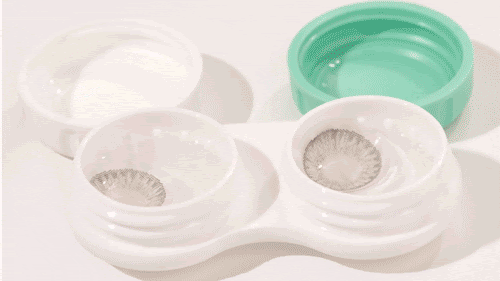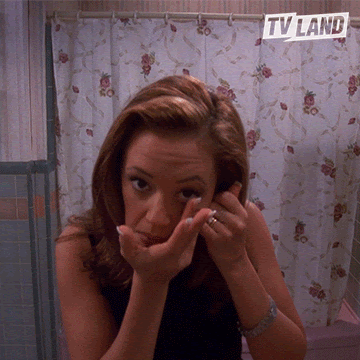-
See the Difference: Save $1,000 on LASIK , Find More
*Must mention this promotion and be treated before April 30 of 2025 to qualify. $1,000 off for both eyes on standard Wavelight price, $500 off for one eye. Cannot be combined with any other offers.
The Dangers of Sleeping in Your Contacts

Doctors, scientists and optometrists alike are in agreement on this one: you shouldn’t be sleeping in contacts. And even though everyone ~knows~ you shouldn’t sleep with contact lenses in, sometimes it just happens (like “accidentally” eating two jars of nutella or “accidentally” watching 4 hours of Netflix before bed).
At the end of a long day, remembering to wash your face and brush your teeth can feel like a tall order. And when it comes to taking out contacts, you can basically forget about it. But just like skipping your tooth brushing routine can pose a threat to your oral health, wearing contacts while you sleep can wreak havoc on the health of your eyes.
Just because it’s tempting or convenient, you should still avoid going to bed with contacts in to prevent serious eye issues. Lets look into the science behind the possible risks and learn some helpful information about this dangerous habit.
Contacts Restrict Oxygen to Your Eyes
When your eyes are open, they receive oxygen from the air, which (like most bodily functions) is needed to properly function. That means when you put in contacts, your eyes get a bit less oxygen. And when you close your eyes, the supply gets even lower. This makes your eyes ripe for irritation, inflammation and redness- which can lead to impaired vision.
This decreased oxygen supply can also increase your risk of getting bacterial or fungal infections, as well as corneal ulcers. More on that in a minute.

Is it Bad to Sleep With Your Contacts In?
The short answer is: yes.
Sleeping with your contacts in is a terrible idea.
If you need a little motivation to get off the couch and take out your contacts, here are some scary issues that can arise if you fall asleep in your contacts:
Sleeping in Contacts May Give You Pink Eye
The most common eye problem you might experience, if you’re sleeping in your contacts, is conjunctivitis (AKA pink eye). This common eye infection can be also caused by allergies or coming in contact with someone else who has it, but it’s mainly caused by wearing contacts overnight.
Why? Well, sleeping in your contacts can make your eyes more susceptible to microscopic tears on the cornea, and can increase your odds of bacteria (as well as fungi) entering and getting trapped in your eye for an extended period.
If you want to avoid a bad case of pink eye, take out your contacts before you hit the hay.
Sleeping in Contacts Could Give You an Eye Ulcer
People who sleep in contact lenses are at an increased risk of corneal ulcers. According to this study, corneal ulcers are one of the largest causes of blindness in the world. Basically, a corneal ulcer is a tiny, open wound in your eye. Like we covered above, contact lenses already block oxygen to your eye. So when your eyelids are closed during the night, your cornea is literally starved of oxygen. This creates the perfect environment for bacteria to take over, causing a breakdown in the epithelium, forming an ulcer.
Delays in treatment can cause lifelong vision damage, so it’s safe to say this condition should be treated as soon as it happens.
You Could Suffer Serious Red Eye if You Sleep in Your Contacts
If you sleep in your contacts, you might experience an eye condition called CLARE (or contact lens acute red eye). Also referred to as Tight Lens Syndrome or Contact Lens Over wear Syndrome, this is usually accompanied by light sensitivity, redness, tearing, and decreased vision.
Even though you probably hate wearing glasses (join the club), you might want to switch to your frames at night so you don’t forget to take out your contacts before falling asleep.
Sleeping in Contacts Can Make Them Fit Poorly
Wearing your contacts overnight, or for prolonged periods, can cause serious irritation- causing bumps to form underneath your eyelids. Giant papillary conjunctivitis (GPC) causes the inside of your eyelid to become red, swollen, and irritated. Patients who wear contact lenses while they’re sleeping have the greatest chance of experiencing this unpleasant condition.
The bumps that form as a result of GPC make them fit poorly, and can be difficult to resolve. If this happens to you, stop wearing your contacts for a week and see if your symptoms have subsided.

How to Reduce the Risk of Contact-Related Eye Infections
To reduce the risk of developing any negative symptoms or an eye infection, here are some good rules to follow if you’re part of the Contact Club:
- Never ever go to sleep in your contact lenses.
- Don’t reuse disposable contacts.
- Take your contacts out before swimming.
- Replace disposable contact lenses frequently.
- Don’t touch or rub your eyes with dirty hands.
- Never share your contacts with anyone else
- Refrain from buying fashion contact lenses.
- Always use clean, sanitized hands when putting in/taking out your contacts
Unfortunately, contacts can cause quite a headache- so make sure you follow the guidelines above if you’re a lens wearer.
If you’re experiencing redness, pain, light sensitivity, decreased vision, or swelling while wearing your contacts, carefully take them out and contact your eye doctor. They’ll help pinpoint the exact issue and help you determine what caused the issue in the first place.
The Final Word: Prioritize Your Eye Health
In conclusion, the perils of sleeping in contact lenses cannot be overstated. While they offer convenience, the risks far outweigh the benefits. By sticking to proper contact lens hygiene and avoiding overnight wear, you can protect your ocular health and enjoy clear vision without compromising comfort or well-being.
Want to simplify your nighttime routine? You can experience 20/20 vision without contacts or glasses with a simple, 15-minute LASIK procedure. You can kiss your contacts goodbye for good at LasikPlus.
Check out more information to help get you started:
YOU MIGHT ALSO LIKE...
VISION CENTERS NEAR ME
Enter your zip code, city, or a doctor name below to find a vision center.
Find out if LASIK is right for you
Congratulations!
Your vision issues can most likely be corrected with a LASIK procedure. Schedule a free consultation today.
Answer 5 simple questions to see if you are a candidate
What is your age group?
Do you wear...
With corrective lenses, do you have...
Have you ever been told that you have astigmatism?
Have you ever been told that you have dry eyes?
Request an Information Kit
Learn about your surgeon, the latest advanced technology, procedures, options and benefits, financing options, and what to expect from your LASIKPlus experience.









